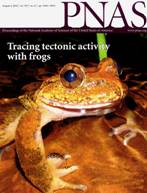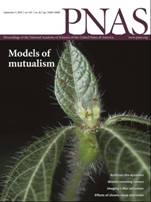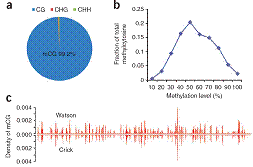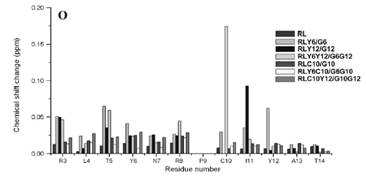For Kunming Institute of Zoology (KIZ-CAS) , 2010 was a year worth celebration. During 2010, KIZ has gotten 72 academic projects, including National Natural Science Foundation of China, National Key Basic Research Program, National Science Fund for Distinguished Young Scholars, Key Programs for Science and Technology Development of China, Fond for Outstanding Scholars of Yunnan Province, value 77 billions (RMB). Two hundred forty-nine academic articles have been published, including 183 SCI articles (6 on Nature and its series, 2 on Science, 12 were IF>10, and 29 were IF>10),60 CSCD articles and 4 abstracts of international conferences. Eighteen patents were pending while 6 have been approved. The institute also received first prize of Yunnan Provincial Natural Science twice.
Research Highlights of the year
1.  The research results conducted by ZHANG Yaping (CAS member, KIZ) and David B. Wake (AAS member, UC-Berkley), “Spiny frogs (Paini) illuminate the history of the Himalayan region and Southeast Asia” ( www.pnas.org/cgi/doi/10.1073/pnas.1008415107) , was published as the cover story of PNAS, August 2010. The renowned geologist An Yin said “The work presented by Che et al. is the first large-scale paleogeographic reconstruction of the Indo-Asian collision zone using a biological approach. This is an important start and I expect more work along the same line to emerge in the coming decades.” Meanwhile, Nature China also released comment of this research highlight.
The research results conducted by ZHANG Yaping (CAS member, KIZ) and David B. Wake (AAS member, UC-Berkley), “Spiny frogs (Paini) illuminate the history of the Himalayan region and Southeast Asia” ( www.pnas.org/cgi/doi/10.1073/pnas.1008415107) , was published as the cover story of PNAS, August 2010. The renowned geologist An Yin said “The work presented by Che et al. is the first large-scale paleogeographic reconstruction of the Indo-Asian collision zone using a biological approach. This is an important start and I expect more work along the same line to emerge in the coming decades.” Meanwhile, Nature China also released comment of this research highlight.
2.  “Economic Contract theory tests models of mutualism” (www.pnas.org/cgi/doi/10.1073/pnas.1005294107), the cover story of PNAS,September 2010, observed the symbiotic relationship of biological world with a fresh eye. In this article, Douglas W.Yu (KIZ-CAS) and his colleges concluded that the partner fidelity feedback (PFF) theory might place previously underappreciated constraints on the evolution of mutualism and explain why punishment is far from ubiquitous in nature, which questioned the classical host sanctions (HS) theory, which posits the necessity of costly punishment to maintain mutualism.
“Economic Contract theory tests models of mutualism” (www.pnas.org/cgi/doi/10.1073/pnas.1005294107), the cover story of PNAS,September 2010, observed the symbiotic relationship of biological world with a fresh eye. In this article, Douglas W.Yu (KIZ-CAS) and his colleges concluded that the partner fidelity feedback (PFF) theory might place previously underappreciated constraints on the evolution of mutualism and explain why punishment is far from ubiquitous in nature, which questioned the classical host sanctions (HS) theory, which posits the necessity of costly punishment to maintain mutualism.
3. 
WANG Wen and his colleges published the article - “single base–resolution methylome of the silkworm reveals a sparse epigenomic map” (www.nature.com/doifinder/10.1038/nbt.1626) - on Nature Biotechnology, May 2010. This work contributed to our understanding of epigenetics in insects, and in contrast to previous studies of the highly methylated genomes of Arabidopsis1 and human, demonstrated a strategy for sequencing the epigenomes of organisms such as insects that have low levels of methylation.
4. 
October 2010, PNAS reported the results of the transgenic non-human primates achieved by JI Weizhi (KIZ-CAS) and his colleges, “Transgenic rhesus monkeys produced by gene transfer into early-cleavage–stage embryos using a simian immunodeficiency virus-based vector” (www.pnas.org/cgi/doi/10.1073/pnas.1006563107). This achievement was the first successful case of transgenic rhesus monkeys in China, and this technology is important for creating valuable animal models of human physiology so that the etiology of diseases can be studied and potential therapies for their amelioration may be developed.
5.  LAI Ren(KIZ-CAS) and LIN Donghai(SIMM-CAS) made progress on frog’s antioxidant peptide system. The relevant article ison Free Radical Biology & Medicine - “Frog skins keep redox homeostasis by antioxidant peptides with rapid radical scavenging ability” (http://dx.doi.org/10.1016/j.freeradbiomed.2010.01.036). According to the results of LAI, LIN and their college, Cys plays the key role in rapid radical scavenging of the amphibian antioxidant peptides and the antioxidant peptides in frog skins are fast-acting antioxidants containing the ability to rapidly and constantly eliminate free radicals and thus protect skins from reactive oxygen species (ROS) injury in real time.
LAI Ren(KIZ-CAS) and LIN Donghai(SIMM-CAS) made progress on frog’s antioxidant peptide system. The relevant article ison Free Radical Biology & Medicine - “Frog skins keep redox homeostasis by antioxidant peptides with rapid radical scavenging ability” (http://dx.doi.org/10.1016/j.freeradbiomed.2010.01.036). According to the results of LAI, LIN and their college, Cys plays the key role in rapid radical scavenging of the amphibian antioxidant peptides and the antioxidant peptides in frog skins are fast-acting antioxidants containing the ability to rapidly and constantly eliminate free radicals and thus protect skins from reactive oxygen species (ROS) injury in real time.
